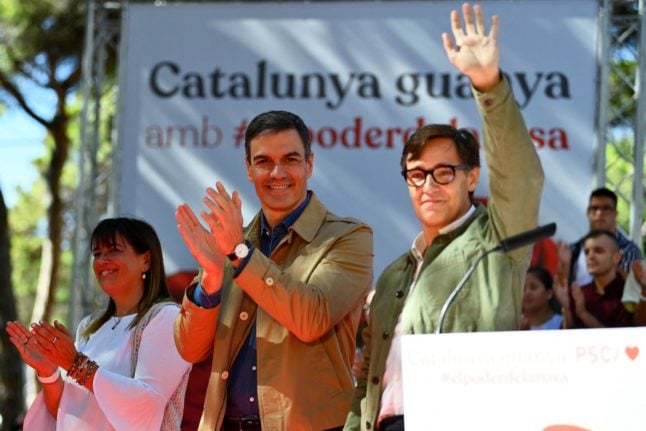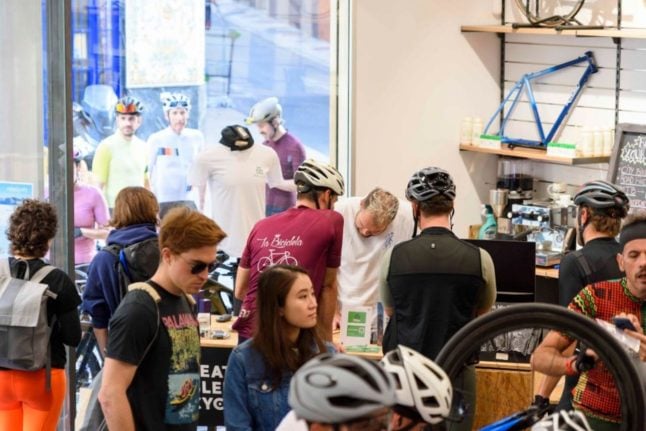This wealthy northeastern region of some eight million people votes Sunday to elect deputies to its 135-seat regional parliament.
Opinion polls suggest Sánchez’s Socialists are well ahead of Puigdemont’s hardline separatist JxCat and its rival ERC, led by current regional leader Pere Aragonès.
A poll by Spain’s leading daily El País found that a coalition between separatist parties Junts, ERC and CUP would only have a 28 percent chance of reaching the majority; while a coalition by left-wing parties the PSC (PSOE’s Socialist branch), ERC and Comuns has a 78 percent possibility of forming a government.
Another poll by Spain’s state-run CIS research body also has the PSC as the favourites to win with between 29.8 and 33.2 percent of the vote.
Other commentators haven’t ruled out the possibility of an electoral stalemate with neither block capable of obtaining a majority, which would result in repeat elections in the region of 8 million people.
Junts’ Puigdemont was Catalan leader at the time of the failed independence bid in October 2017 which sparked Spain’s worst political crisis in decades.
Despite fleeing Spain to avoid prosecution, he has remained active in the region’s politics, leading JxCat from Belgium. He is hoping his imminent return from exile under an amnesty bill soon to become law will boost his chances in the vote.
For Sánchez, seizing back power from the separatists – who have ruled the region for a decade – would be a major victory in his efforts to turn the page on the crisis sparked by the secession bid.
READ ALSO: Why regional elections in Catalonia matter to Spain’s future
It would also allow him to press the restart button on his latest term in office, which began in November.
So far, it has been soured by bitter right-wing opposition and a corruption probe into his wife, which almost prompted his resignation late last month.
Socialist hopes high
A win by the Catalan Socialist party would allow the region “to turn over a new leaf after 10 lost years” said its leader Salvador Illa, 58, who served as Spain’s health minister during the pandemic.
Although the Socialists won the most votes during the last regional election in February 2021, Illa was unable to piece together a governing majority. The separatist parties took power by clubbing together to form a 74-seat coalition.
Since becoming Spanish prime minister in June 2018, Sánchez has sought to defuse the Catalan conflict. He has maintained dialogue with the moderate ERC and pardoned the separatists jailed over their role in the 2017 secession bid.
And late last year, he moved to push through an amnesty bill for those still wanted by the justice system in exchange for the separatists’ parliamentary support for him to secure a new term in office.
Under terms of the bill, Puigdemont – who fled Spain to avoid prosecution after the botched independence bid – will finally be able to return home after more than six years in exile.
It will be put to a final parliamentary vote later this month.

High stakes for Puigdemont
Puigdemont is for the moment unable to enter Spain, where he is still subject to an arrest warrant.
So he has been campaigning for Sunday’s election from a southern French seaside town near the Spanish border, and polls suggest his support has been rising steadily in recent weeks.
READ MORE: Exiled separatist leader rallies support in France ahead of Catalan election
“The independence movement has stalled a bit (since the botched 2017 separatist bid) but I think Puigdemont’s candidature has generated some enthusiasm,” Arnau Olle, a 29-year-old IT specialist from a town near Barcelona told AFP at a weekend campaign rally in Argeles-sur-Mer.
Puigdemont, who served as Catalan leader from January 2016, wants to have another shot at leading the region if the separatists retain a majority, and if JxCat comes out on top.
But that could be complicated given the divisions within the pro-independence movement and the emergence in recent months of the ultranationalist Catalan Alliance. While polls suggest it could win several seats, no other party wants to enter into a pact with it.
For Puigdemont, Sunday’s vote is also a high-stakes game, not least because he has pledged to retire from politics if he does not win.
Polls suggest the Socialists will win around 40 seats, which would mean it would need allies to reach the 68 required for a governing majority.
One possible alliance would involve the far left and Aragones’s ERC, but that would likely cause an implosion within the independence movement.
Political analyst Ernesto Pascual of the Autonomous University of Barcelona did not see such alliances hurting Sánchez’s left-wing government, whose fragile parliamentary majority depends on support from both JxCat and ERC.
Neither party has an interest in doing anything that might “force Sánchez to resign and trigger new elections”, he said.
That could change the scenario dramatically, he explained, referring to the possibility of a new government of the right which has vowed to rollback any move to amnesty the separatists.



 Please whitelist us to continue reading.
Please whitelist us to continue reading.
Member comments